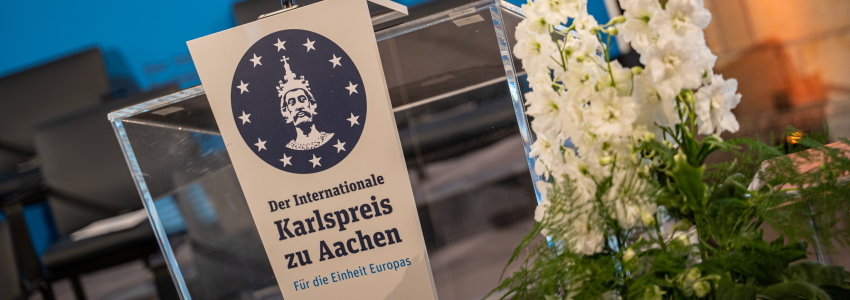Explanatory statement
EXPLANATORY STATEMENT FROM THE BOARD OF DIRECTORS OF THE SOCIETY FOR THE CONFERRING OF THE INTERNATIONAL CHARLEMAGNE PRIZE OF AACHEN
TO
THE PRESIDENT OF THE REPUBLIC OF LITHUANIA
DR. DALIA GRYBAUSKAITE
With the decision to award the Charlemagne Prize of Aachen 2013 to Dr Dalia Grybauskaite, the Board of Directors of the Society for the Conferring of the International Charlemagne Prize of Aachen pays tribute to one of the outstanding personalities in the Baltic region and to her exceptional endeavours for deeper integration in the European Union and for finding solutions for the current crisis.
Until the early 1990s the Baltic Sea was a microcosm of European separation. A sharp dividing line cut through its centre. Today our experience is totally different: the Baltic Sea is again, as so often in its history, an example and medium for the unity of Europe. With the exception of Russia, the Baltic Sea is completely surrounded by EU member states and thus a continental sea for the European Union; it no longer separates but connects. Historical cooperation patterns and former trade relations have been revived and the Baltic is increasingly becoming an ideal breeding ground for new impulses and an important, modern, and highly developed area of European cooperation. Liberated from the ice of the cold war, the Baltic is becoming a sea of possibilities which is especially attributable to the still young Baltic States that are now members of the EU.
In 2013, the tenth anniversary of the signing of the Lithuanian, Estonian, and Latvian membership agreements will evoke one of the great moving events of the revolutionary decade. What no one dared to believe has long become European reality again. Lithuanians, Estonians, and Latvians have not only regained their right to self-determination, but they are now emancipated members of the European Union. The self-determination of three relatively small nations in the big European family has triumphed in an impressive way.
In order to lead the still young democracies into the EU after they had regained their freedom and independence, a transformation process of historic dimensions was set in motion which also required many sacrifices from the citizens. Therefore the economic downturn during the dramatic crisis of the years 2008/2009, after several years of economic growth, was all the more difficult.
Thus, the path the Baltic republics have taken since then is all the more impressive. To do so, the resolute commitment of outstanding personalities, who paved the way to overcoming the crisis with courage and the right judgment, with determination and self-confidence, was required; personalities who could give guidance even in difficult times while at the same time bestowing confidence in their own people and also in their partners in the European Union. And when in times of the greatest uncertainties when everyone is speculating on the disintegration of the Euro zone, the republic of Lithuania is still striving to become a member of the currency union, this is an important signal that now is the time to increase and strengthen European cooperation.
Dalia Grybauskaite was born 1st March 1956 in Vilnius. After working as a personnel inspector at the Lithuanian state philharmonic she began studying political economics in 1975 at Leningrad University. After graduating she returned to Vilnius and worked briefly as a secretary at the academy of sciences. Later she lectured political economics and global financing at the University of Vilnius (until1990). 1988 she received a PhD in social sciences at Moscow Academy. In 1991 she attended a special training course for Senior Executives at the Georgetown University in Washington over several months. Subsequently she started her ministerial career in the Lithuanian government.
From 1991 until 1994 she held several positions at the Ministry of International Economic Relations and the Ministry of Foreign Affairs. In 1994/95 she was posted as an Envoy Extraordinary and Minister Plenipotentiary at the Lithuanian Mission to the EU, while in 1996 she started working in her country’s Embassy in the United States. 1999 she was nominated deputy finance minister in the government of Kubilius and had considerable impact on how the financial outcome of the crisis with Russia was mastered. In 2000 she became deputy minister in the Ministry of Foreign Affairs and one year later was promoted to minister of finance under Prime Minister Brazauskas.
After Lithuania joined the European Union on 1 May 2004, she became member of the European commission where she initially was responsible for education and culture and later for finances. From her time as finance minister well-acquainted with negotiations with the EU, the World Bank, and the International Monetary Fund, Dalia Grybauskaite soon gained respect in the commission. She reformed the structure of the EU budget and created a structural subsidy fund for economically weak regions. Just one year after joining the commission (in November 2005) she was already nominated “commissioner of the year” for her solid and efficient work. “My work has absolute priority. I am completely focused on my targets. I do everything to achieve them” is what the independent commissioner made clear from the start.
“This included letting her officials do the job of the (then) British EU council presidency when it was needed: in the decisive night at the EU summit meeting in December [2005] Grybauskaite’s team calculated the figures which finally led to the agreement of the budget for the years 2007 until 2012” (Cicero, 25.1.2006). She also was strongly committed to realizing the Lisbon strategy and repeatedly called on the member states to close the gaps in the implementation.
In February 2009, just three months after announcing that she wanted to succeed the outgoing head of state Valdas Adamkus, she enjoyed a triumphal election success. With nearly 70 % of all votes in the first ballot on 17 May, the popular economics scientist left her competitors with no chance.
Meanwhile her return to Lithuania was mainly affected by the dramatic economic downturn. As a result of this the gross domestic product in the year 2009 sank by nearly 15 per cent. “I cannot stay away when at home everything is going to pieces” is what she stated as the motivation for her candidacy and in the run-up to her election she put the stabilisation of the economic and financial system at the centre of her presidency. Although the tasks of head of state are chiefly representative, the overwhelming majority of Lithuanians saw the financial expert, who had early on demanded a strict budget discipline and had warned of the results of the economic crisis, as a resolute crisis manager which was partly missing in the government. The Prime Minister of the time Andrius Kubilius also declared he was “happy that she has a clear message of change which is vital for Lithuania”.
Consequently, she supported the consolidation efforts of Kubilius’s government, in the process of which the Lithuanian economy recovered slowly in 2010 and 2011 and meanwhile has again developed into one of the most dynamic economies in the EU. With total debts of below 40 per cent of the GDP (2011) the Lithuanians are far below the Maastricht criteria. The unemployment rate, which was temporally above 18 per cent, has been considerably decreased, just as the budget deficit which is to be around four per cent in the current year. This all came about through a rigid austerity program although Lithuania as Dalia Grybauskaite stresses in retrospect was hit for the second time by a severe crisis: “between 1998 and 1999 we were hit the first time when we became caught up in the swirl of the Russian crisis. Then we did not borrow any money and we learned how to deal with such a situation. Today we receive support anyway from the European cohesion and agriculture funds. For us these are considerable sums. When the crisis arrived we knew immediately that we had to implement far-reaching measures ourselves and especially that we had to reduce expenditure. Our currency is bound to the Euro so that the only way out for us was to cut costs. Asking for help would not make sense, as the markets react to government strengths and achievements and not to how much money they beg of the International Monetary Fund or other institutions. Governments that ask for help, only demonstrate that they cannot help themselves. Lithuania has now started to recover” (FAZ, 20.6.2011).
Although the president does not want to speculate on a concrete date, she persists with her objective to lead Lithuania into the Euro zone. At the same time she is adamant that: “If one has a mutual currency, one needs a mutual fiscal policy or a very closely coordinated fiscal policy […]. Every economist says: if you want a mutual currency, you must have mutual regulations.”
Dr Grybauskaite not only strives to establish a good neighbourly relationship to the European neighbours but also to Russia. In terms of security and diplomatic aspects, she is often a bridge-builder for the EU to eastern European countries.
At international gathering she continually calls for the preservation of freedom and understanding amongst nations as well as for the protection of the environment and a sustainable use of natural resources.
In these days it is worth having a look at the north-east of the European Union where the evidence can be found how a clear strategy, strong discipline, and a self-sacrificing spirit can overcome a dramatic crisis. In recognition of her personal achievements for the European integration and for the exemplifying development of her country, the Board of Directors of the Society for the Conferring of the International Charlemagne Prize of Aachen will award the 2013 Charlemagne Prize to the President of the Lithuanian Republic Dr Dalia Grybauskaite.




